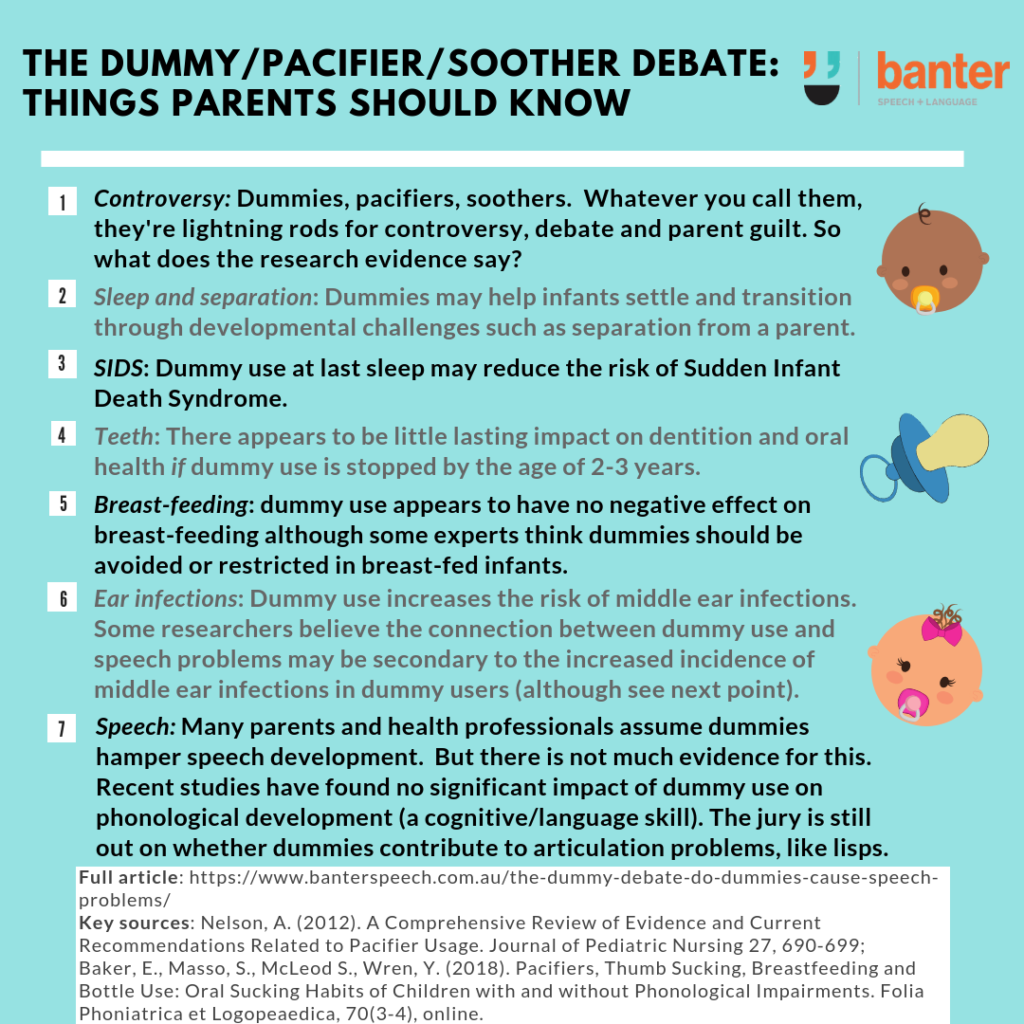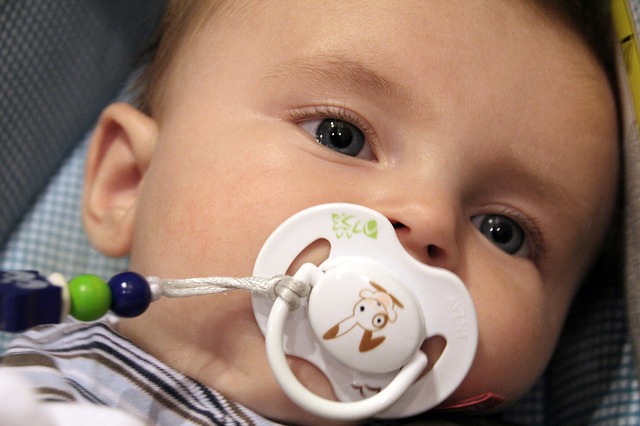The dummy debate: do dummies cause speech problems?
Dummies, pacifiers, soothers. Whatever you call them, these little objects are lightning rods for controversy, debate and parent guilt.
Despite decades of research and expert opinion – much of it low level, contradictory, sometimes alarmist, and confusing – parents still use dummies for the simple reason that they often work to settle their babies and toddlers.
What the evidence so far tells us about the general benefits and risks of dummy use:
- Low level studies and expert opinion (and the experience of lots of tired mums and dads) suggests that dummies may help infants settle (e.g. Vogel & Mitchell, 1997) and transition through developmental challenges such as separation from a parent (e.g. Triebenbacher & Tegano, 1993).
- Multiple case-controlled studies suggest that dummy use at last sleep may materially reduce the risk of Sudden Infant Death Syndrome (e.g. Hauck et al, 2005; AAP Taskforce on SIDS, 2005/2009).
- Longitudinal studies and expert opinion suggests little lasting impact on dentition and oral health if dummy use is stopped by the age of 2-3 years (e.g. Poyak, 2006).
- Randomised controlled trials (the highest level of evidence) demonstrate no negative effect on breast feeding outcomes, although expert opinion and some lower quality studies suggest that dummies use should be avoided or at least highly restricted in breast-fed infants (e.g. Jaafar et al, 2011, World Health Organisation, 2010).
- Randomised controlled and other studies, as well as expert opinion, all consistently suggest there is an increased risk of acute otitis media (middle ear infection) with dummy use (e.g. Hanafin & Griffiths, 2002).
As a speech pathologist, the key themes I take from this research are that dummy use should be limited with breast-feeding infants (and only after breast-feeding is firmly established), stopped altogether by the age of 2-3 (to limit the effects on dentition), and avoided in infants and children with a history of repeated middle ear infections and conductive hearing problems.
But what about dummies and speech development?
Many parents and health care professionals assume that dummies hamper speech development. The theory goes that excessive and prolonged dummy use limits babbling and vocalisation, and thus speech development – a logical argument.
But is it supported by hard evidence?
A recent review of the published research concluded that, so far, the causal link between dummy use and speech development appears to be weak:
- One study found that pre-school and school age children with speech disorders were more likely than a group of children with normal speech to have used a thumb, dummy or bottle for more than 24 months, but the difference was not statistically significant (Fox et al, 2002);
- A 2006 study documented a greater incidence of inadequate lip tone and unfavourable tongue positions during speech in children with an open bite related to dummy sucking (Verrestro et al, 2006);
- Another study found that dummy use had a negative impact on speech in 3-5 year old children only if the dummy had been used for more than 3 years (Barbosa et al., 2009);
- In contrast, a recent study found no significant impact of prolonged dummy use on speech articulation (Shots et al, 2008);
- Several studies have shown that breast-feeding for more than 9 months appears to offer a protective effect against speech impairment among dummy users (e.g. Harrison & McLeod, 2010);
- Some researchers believe the connection between dummy use and speech problems may be secondary to the increased incidence of otitis media in dummy users; although it’s worth noting that the link between otitis media and long term speech and language outcomes is also not clear and controversial, e.g. Roberts et al, 2004.
Bottom line
To date, studies show no strong or consistent association between dummy use and speech development. Prolonged dummy use may negatively impact speech development. But further research is needed before any evidence-based conclusions can be drawn either way.

Main source: Nelson, A. (2012). A Comprehensive Review of Evidence and Current Recommendations Related to Pacifier Usage. Journal of Pediatric Nursing (2012) 27, 690-699.
Image: http://tinyurl.com/kg4axs8

Hi there, I’m David Kinnane.
Principal Speech Pathologist, Banter Speech & Language
Our talented team of certified practising speech pathologists provide unhurried, personalised and evidence-based speech pathology care to children and adults in the Inner West of Sydney and beyond, both in our clinic and via telehealth.








